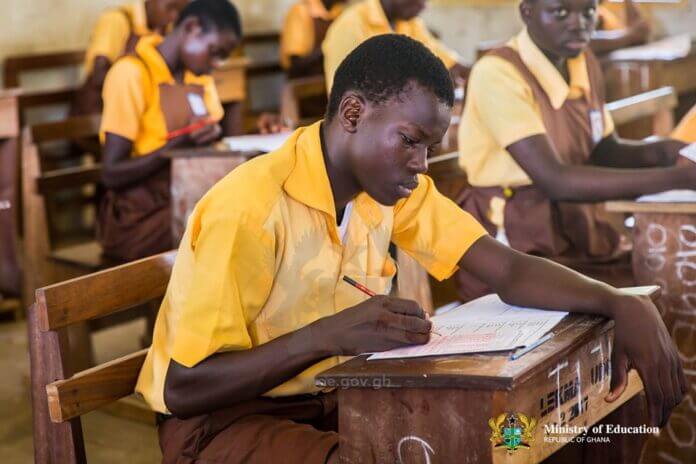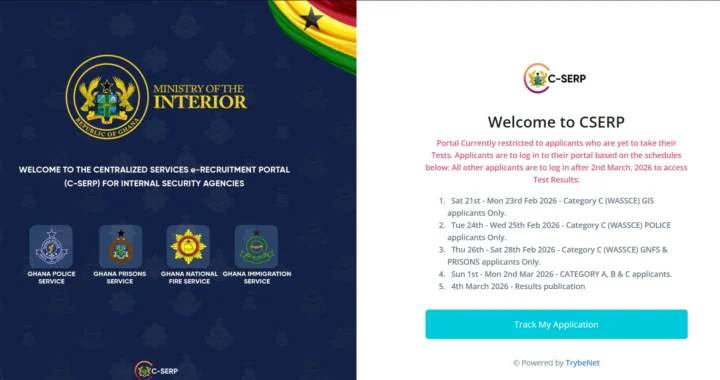All You Need to Know About the 2025 BECE Results: Grading Systems, School Placement, Cut Off Points, and More

How to Pass 2025 BECE With Ease: Secret Trick Revealed
The Basic Education Certificate Examination (BECE) is a pivotal academic assessment in Ghana, serving as the final examination for students who have completed their junior high education. Primarily designed to evaluate students’ mastery of the core subjects taught during these formative years, the BECE results play a significant role in the educational landscape of the country. They not only reflect the academic capabilities of students but also significantly influence their future educational paths, particularly concerning secondary school placements.
As students progress through their junior high years, the preparation for the BECE often encompasses several critical learning elements, including mathematics, science, social studies, and English, among other subjects. The significance of these results lies in their impact on students’ academic trajectory; they determine eligibility for admission into various secondary schools, which often have specific cut-off points based on the performance in the examination. Consequently, a student’s BECE score can set the foundation for their future educational opportunities, influencing whether they gain entry into academic or vocational institutions.
Moreover, the BECE results are not merely reflective of individual performance but also serve as a metric for assessing the quality of education across the nation. Schools are often evaluated based on their students’ outcomes in the BECE, which can affect their reputation and subsequently, enrollment rates. As students and educators alike prepare for the upcoming examination, understanding the intricacies of the grading systems and the implications of the results becomes essential, paving the way for informed decisions in the realm of secondary education.
Expected Release Date of the 2025 BECE Results
The Basic Education Certificate Examination (BECE) results are an essential milestone for students in their academic journey, particularly in West African countries. As we approach 2025, anticipation for the release of these results grows steadily among students, parents, and educators. The West African Examinations Council (WAEC), which oversees the administration and grading of the BECE, typically adheres to a specific timeline for releasing examination results, which can provide some insight into what to expect for the 2025 examinations.
Historically, WAEC has aimed to release the BECE results within a span of approximately 60 to 90 days after the last examination paper has been administered. In this context, if the examination is conducted in May or June of 2025, stakeholders could anticipate that the results may be released by late July to August of the same year. Official announcements from WAEC are invaluable during this period, as they will confirm the exact release date, providing clarity and guidance for everyone involved.
Further complicating the timeline, factors such as the successful completion of the grading process, verification of results, and any potential delays in administrative procedures can influence the official announcement. In recent years, WAEC has made efforts to streamline the grading system, which may positively impact the turnaround time for result release. Keeping abreast of any communications from WAEC, including press releases and social media updates, will prove essential for students eager to learn their results and plan their next steps accordingly.
In summary, understanding the expected timeline for the release of the 2025 BECE results will help students and their families prepare for the critical decisions that follow, including school placements and further academic pursuits.
Understanding the Grading System
The Basic Education Certificate Examination (BECE) grading system is a vital aspect of assessing student performance at the junior high school level in Ghana. The results obtained from this examination play a crucial role in determining students’ eligibility for various academic paths, including senior high schools and technical institutions. The grading system utilizes a scale from A to F, encompassing a detailed scoring range that reflects students’ knowledge and understanding of the curriculum.
A grade of ‘1’ indicates excellent performance, typically awarded for scores ranging from 80% to 100%. This is followed by ‘2’, denoting a good performance for scores between 79% to 70%, and ‘3’, which represents an average performance at scores from 69% to 60%. Grades ‘4’ and ‘5’ reflect below-average performances up to grade 9 with scores of 40% to 49% and 30% to 39% respectively. Finally, a grade of ‘9’ indicates a fail, with scores below 30%, highlighting the need for further study or alternative educational paths.
The BECE grading system has undergone various modifications over the years, aiming to enhance clarity and provide a standardized evaluation framework. With the introduction of clear classifications, stakeholders including educators, parents, and students have a shared understanding of academic expectations. The implications of these grades are significant; for instance, high grades correlate with preferable placement in prestigious senior high schools, while lower grades may restrict access to certain educational opportunities.
Understanding this grading system is essential for students and their guardians as they navigate the possibilities for future academic pursuits. Furthermore, it is integral to monitor changes in grading and results over the years, ensuring that students remain informed and prepared for the next stages of their education.
School Placement Process Explained
The school placement process for students transitioning from the Basic Education Certificate Examination (BECE) to secondary schools is a critical phase in the educational journey. This process primarily hinges on the performance of students as reflected in their BECE results. When results are released, a placement committee receives the analysis of each student’s scores, which forms the basis for their selection into various secondary schools across the country.
One of the primary criteria considered during the placement process is the cut-off points established for different secondary schools. These cut-off points are determined by various factors including the school’s reputation, available resources, academic performance trends, and the total number of applicants. Schools with robust academic programs or higher performance levels typically have higher cut-off points. The placement exercise effectively aims to ensure that students are matched with institutions that correspond with their capabilities and educational aspirations.
In addition to academic performance, other factors contribute to the placement decision. These may include geographical considerations, special needs requirements, or affinities for specific educational programs, such as technical or vocational training. As such, students may be placed in schools that not only reflect their academic achievements but also their personal interests and future goals.
The importance of the placement exercise cannot be overstated. A successful placement lays the groundwork for a student’s future, particularly in shaping their academic and career trajectories. Access to quality secondary education is fundamental to further educational opportunities, and thus, ensuring an equitable and comprehensive placement process is vital for all students. Ultimately, this exercise aims to facilitate a smooth transition, providing a well-rounded education that prepares students for the challenges ahead in their academic pursuits.
Cut-Off Points for Schools
The cut-off points for secondary schools in Ghana play a crucial role in the placement process following the Basic Education Certificate Examination (BECE). These points, which are determined based on the performance of students in their BECE, serve as a benchmark for admission into various schools. The Ghana Education Service (GES) evaluates the overall results from national examinations to establish these cut-off points. Factors influencing these cut-off points include the number of applicants, available space in each school, and the academic performance trends of previous years.
Typically, schools known for their academic excellence or specialized programs tend to have higher cut-off points. For instance, top-tier schools such as Achimota School, Prempeh College, and Wesley Girls’ High School often set higher thresholds due to their reputations and competitive academic environments. Such schools attract a large number of high-performing candidates, necessitating stricter cut-offs to maintain their standards. Conversely, schools in less urban areas or those with lower academic rankings may have lower cut-off points, making them more accessible to a broader range of students. This accessibility is essential in providing educational opportunities to students from various backgrounds.
Understanding cut-off points is vital for aspiring secondary school students and their parents. A prospective student must be aware of these points and target schools accordingly. Engaging in proper research and preparation ahead of the BECE can enhance a student’s chances of achieving scores that meet or exceed these cut-off points. Moreover, it’s essential for students to consider their preferences for school culture, curricular offerings, and other factors, alongside the cut-off points when making informed decisions about their secondary education journey.
Common Challenges and Solutions
Students often encounter various challenges when interpreting their results from the Basic Education Certificate Examination (BECE) and navigating the subsequent school placement process. One prevalent issue is the misunderstanding of the grading system. The BECE results are based on a specific grading scale that students may find confusing. This confusion can lead to significant stress and anxiety regarding their academic future. To combat this, students are encouraged to familiarize themselves with the official grading criteria early on. Schools and academic institutions should provide accessible resources that explain the grading process clearly and concisely, ensuring that students can accurately assess their performance.
Another challenge is the pressure of competing for limited placements in senior high schools. This competitive environment can be disheartening for students who may not have achieved the cut-off points required for their desired institutions. To alleviate this pressure, it is vital for students to have a plan in place. They should be informed about alternative schools, including technical or vocational options that align with their interests and talents. Additionally, parents and educators should engage in open discussions with students about their aspirations and the various pathways available, encouraging a mindset that values diverse educational opportunities.
Additionally, students may find navigating the online placement system challenging due to technical difficulties or inadequate instructions. It is essential for students to seek assistance from teachers or fellow students who are familiar with the system. Schools could organize workshops to guide students through the online placement process, ensuring they have the support they need to secure their desired placement. By addressing these common challenges with proactive solutions, students can effectively navigate their BECE results and the subsequent school placement process, leading to a more positive academic journey.
Impact of BECE Results on Future Education
The Basic Education Certificate Examination (BECE) results play a significant role in shaping the educational trajectories of students in Ghana. Serving as a pivotal assessment at the conclusion of junior high school, the BECE results primarily determine students’ eligibility for enrollment in senior high schools (SHS). The performance in this examination not only influences the specific institutions that students can access but also their chosen fields of study. Students wishing to pursue academic disciplines in SHS must secure scores that meet the minimum cut-off points stipulated by various schools.
Moreover, the BECE results can significantly affect a student’s decision to pursue vocational training as an alternative to traditional academic pathways. Students who may not achieve the requisite scores for SHS may opt for vocational schools. This decision can lead to valuable training in various trades, enabling students to acquire practical skills that enhance their employability in the job market. Consequently, the BECE results directly impact the professional paths that students can embark on, emphasizing the examination’s importance in a holistic educational framework.
Beyond direct school placements, the implications of BECE results extend to broader educational considerations. Successful examination outcomes can bolster a student’s self-esteem and motivation, encouraging them to pursue higher educational aspirations, such as tertiary education. Conversely, unsatisfactory performances may result in discouragement, potentially leading students to disengage from the educational system. Thus, the ramifications of BECE results are far-reaching, influencing not just immediate educational choices but also long-term academic journeys and career outcomes for students.
Voices of Experience: Students’ Perspectives
The journey through the Basic Education Certificate Examination (BECE) is a pivotal moment for students in Ghana, marking their transition from junior high to senior high education. Many past candidates have encountered varying experiences when it comes to navigating the results and placement process, and their stories can serve as motivation and guidance for current students. A notable insight comes from Abena, who successfully secured admission into her desired school after her BECE results were released. She reflects, “I was anxious about my grades but knew I had studied hard. When I got my results, I felt a mix of relief and excitement. It taught me the importance of perseverance.” This sentiment echoes the feelings of many students who pour their efforts into preparation, only to feel the weight of expectations during results day.
Additionally, Kwesi, another former BECE candidate, adds, “The placement process can be challenging, especially with cut-off points fluctuating each year. I remember being concerned about meeting the requirements, but I found that reaching out for help from teachers and peers made a significant difference.” Kwesi’s experience underscores the importance of community and support systems during this transitional phase. Many students find themselves navigating the complexities of school placements, and acquiring information from previous candidates can be immensely beneficial.
READ: 2025 BECE Results Upgrade Services: Reality or SCAM and How to Get It
Furthermore, Ama emphasizes the need for resilience, stating, “Not getting my first-choice school was tough, but it pushed me to make the most out of my situation. I learned that success isn’t just about the school you attend; it’s what you make of your opportunities.” These first-hand accounts highlight the diverse paths students take after receiving their BECE results, presenting a tapestry of hope and determination. Such perspectives remind current candidates that the results are only one part of their journey, inspiring them to embrace whichever route they may take following their examination outcomes.
Conclusion and Final Thoughts
In conclusion, the understanding of the 2025 BECE results is critical for both students and parents alike. This standardized examination serves as a crucial juncture in the educational journey of students, directly influencing their school placements and future academic opportunities. The grading systems set parameters for evaluating performance, while cut-off points assist in clarifying the admission process into various secondary schools. By grasping these elements, students can better interpret their results and make informed decisions regarding their next steps.
The blog post has highlighted the significance of familiarizing oneself with the grading system, understanding cut-off points, and anticipating school placements based on performance. Each of these factors plays a pivotal role in determining a student’s potential pathways in their educational careers. It is essential for students to have realistic expectations and to be aware of the options available to them in case they do not meet their desired cut-off points. There are always alternative routes and strategies that can be pursued to ensure continued educational growth.
READ: 2025 BECE Aggregates and the Schools You Will Be Placed In
As the release of the BECE results approaches, it is a time for reflection and planning. Students should remain optimistic about their performance and the opportunities ahead. It is important to be proactive, seeking guidance from teachers, counselors, and parents on how best to navigate the choices available post-results. Emphasizing resilience and adaptability during this time will empower students to embrace their educational futures with confidence, regardless of the outcome of their exams. The journey of learning continues, and each experience contributes to the broader picture of academic success.





 New Aptitude Test Dates for GIS, Police, and Prisons Recruitment 2026 Out
New Aptitude Test Dates for GIS, Police, and Prisons Recruitment 2026 Out  Practice 2026 Ghana Security Services Aptitude Test On Skulmanager.com
Practice 2026 Ghana Security Services Aptitude Test On Skulmanager.com  How to Install the WAEC DigiCert App: Step-by-Step Guide and Public Reaction
How to Install the WAEC DigiCert App: Step-by-Step Guide and Public Reaction  How to Recover Your Lost WAEC Index Number Using DigiCert App
How to Recover Your Lost WAEC Index Number Using DigiCert App